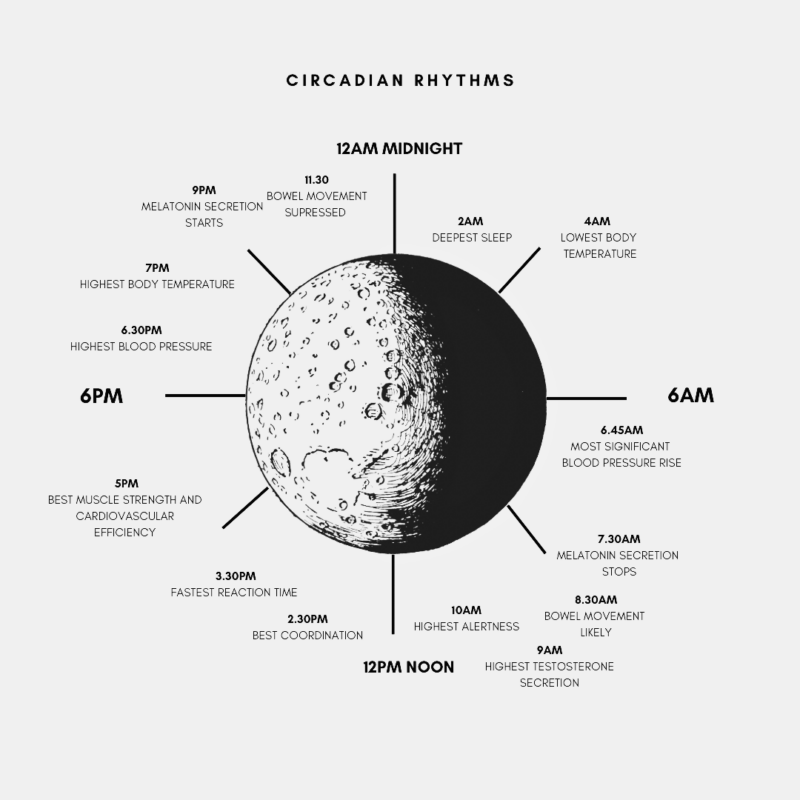On a cellular level, every living organism on the planet is intricately tied to the rhythm of light. This phenomenon influences nearly all life forms—humans, animals, plants, and even microbes. This potent, ancient rhythm that beats within us is known as the circadian rhythm.
At the core of this process, each cell in our bodies (and in other organisms) contains its own biological clock. These clocks operate in harmony with the 24-hour cycle of day and night, which is largely dictated by the Earth’s rotation. The primary regulator of these cellular clocks is light, particularly sunlight and it governs a variety of physiological processes, including sleep-wake cycles, hormone production, digestion, and even mood.
Imagine your body as a finely tuned orchestra, with the circadian rhythm acting as the conductor. When the rhythm is in sync, everything functions harmoniously—energy levels are steady, digestion is efficient, and sleep is restorative. However, when we ignore or disrupt this rhythm, it can lead to a cascade of health problems like fatigue, weight gain, hormonal imbalances, and even increased risk of chronic diseases like diabetes and heart disease.
The Science Behind Your Biological Clock
The primary driver of your circadian rhythm is a group of neurons in the brain called the suprachiasmatic nucleus (SCN), located in the hypothalamus. The SCN acts like a master clock, regulating all the individual cellular clocks in your body. Every single one of your cells follows a circadian pattern, with genes and proteins being activated or deactivated at specific times of the day.
Light plays a pivotal role in this system. In the morning, exposure to sunlight sends a signal to the SCN that it’s time to start the day. This stimulates the release of cortisol, a hormone that helps wake us up and provides energy. As daylight fades, the brain releases melatonin, preparing us for sleep. This beautiful orchestration ensures our body functions optimally when we live in alignment with natural light cycles.
Circadian Disruption
Unfortunately, modern living has severely disrupted this natural rhythm. Constant exposure to artificial light, late-night screen time, irregular eating patterns, and shift work are just some of the culprits. These habits trick our brains into thinking it’s still daytime, suppressing melatonin production and delaying our internal clock. The result? Chronic sleep deprivation, impaired cognitive function, and metabolic dysfunction.
Additionally, circadian disruption can affect the gut microbiome. Research shows that the microbiome follows its own circadian pattern, with certain microbial species flourishing at different times of the day. When we eat late at night or follow erratic eating schedules, we can disrupt this microbial balance, leading to digestive issues and increased inflammation.
Health implications of being out of sync…..
When we are out of sync with our natural rhythm, the long-term consequences can be significant. Studies have linked circadian disruption to an increased risk of obesity, cardiovascular disease, type 2 diabetes, mood disorders, and even cancer. This happens because critical functions like glucose metabolism, insulin sensitivity, and cellular repair are all time-sensitive. If we eat or stay awake during times when our body is naturally primed for rest, it can cause metabolic dysfunction.
Even mental health is impacted. Misaligned sleep-wake cycles can elevate cortisol levels, which contributes to anxiety, depression, and cognitive decline. Essentially, chronic circadian misalignment throws our bodies into a constant state of stress.
Resetting Your Circadian Rhythm
The good news is that you can take simple steps to realign your circadian rhythm and reap the benefits of better health, energy, and focus. Here are some actionable strategies:
- Prioritise Morning Sunlight Exposure
Morning sunlight is the most powerful cue to reset your circadian clock. Aim to spend 10-15 minutes outside each morning without sunglasses. This signals to your SCN that it’s time to wake up and start the day. Natural light exposure also helps suppress melatonin production during the day and promotes better sleep at night.
- Consistent Sleep Schedule
Going to bed and waking up at the same time every day—yes, even on weekends—helps regulate your circadian rhythm. Aim for 7-9 hours of sleep per night and create a bedtime routine that prepares your body for rest, such as dimming the lights and avoiding screens at least an hour before bed.
- Eat According to the Clock
Align your eating schedule with your circadian rhythm. Try to eat your last meal at least three hours before bedtime, and avoid late-night snacking. When we eat late at night, it can interfere with sleep and digestion, as the body is not primed for food metabolism at that time.
- Limit Artificial Light at Night
Exposure to blue light from phones, computers, and televisions at night can suppress melatonin production and shift your internal clock. Use blue light blocking glasses, or switch your devices to “night mode” in the evening to minimise this impact. You can also invest in low-intensity, red-spectrum lighting for the evening.
- Time Your Exercise
Physical activity can influence circadian timing. While it’s beneficial to move your body every day, aim to exercise earlier in the day. Vigorous exercise late at night can delay melatonin production and make it harder to fall asleep.
Your circadian rhythm is more than just a sleep-wake cycle; it’s a foundational pillar of your health. By paying attention to how light, food, and sleep impact this internal clock, you can optimise everything from your energy levels and digestion to your cognitive function and emotional well-being. In our overstimulated world, getting back in sync with nature’s rhythm may be one of the most powerful—and underappreciated—ways to achieve lasting health.
Mini Pure Ashwagandha Root Capsules為您的健康和保健提供強大的補充劑。 立即訂購 |

|
常見問題
Ashwagandha 對身體有什麼功效?
Ashwagandha 是一種傳統的適應原,以幫助身體管理壓力而聞名。它可以幫助平衡荷爾蒙、改善能量水平、減少焦慮和提高睡眠品質。有些研究也顯示 Ashwagandha 對大腦功能、耐力和免疫力有幫助。
Ashwagandha 是否允許在澳洲使用?
是的,Ashwagandha 獲准在澳洲作為營養補充品的列名成分使用和銷售。在 Forest Super Foods,我們確保我們的 Ashwagandha 是 100% 有機且符合澳洲標準和法規。
如果每天服用 Ashwagandha 會怎樣?
許多人每天服用 Ashwagandha 來長期緩解壓力、改善情緒和睡眠。大多數的好處都是在數週內逐漸發現的。請務必依照建議劑量服用,如果您正在服藥或正在處理健康問題,請諮詢專業醫護人員。
Ashwagandha 有副作用嗎?
Ashwagandha 一般耐受性良好,但在某些情況下,可能會引起消化不適、嗜睡或荷爾蒙影響。懷孕期間不建議使用,患有甲狀腺疾病或自體免疫失調的人應該先諮詢醫生。
Ashwagandha 會讓您昏昏欲睡嗎?
Ashwagandha 不像是鎮靜劑,但它可以促進放鬆,並有助於減少過度活躍的壓力反應。這種鎮靜效果可讓您在晚上睡得更深,而不會造成白天昏昏欲睡。
Ashwagandha 需要多久才會生效?
大多數人在持續使用 2 到 4 週之內就會開始察覺到效果。不過,這會因您的健康狀況、用量和使用目的 (例如:壓力、睡眠、能量或荷爾蒙) 而異。










發表評論
所有評論在發表前都經過審查。
本網站受 hCaptcha 保護,並適用 hCaptcha隱私權政策 和服務條款。